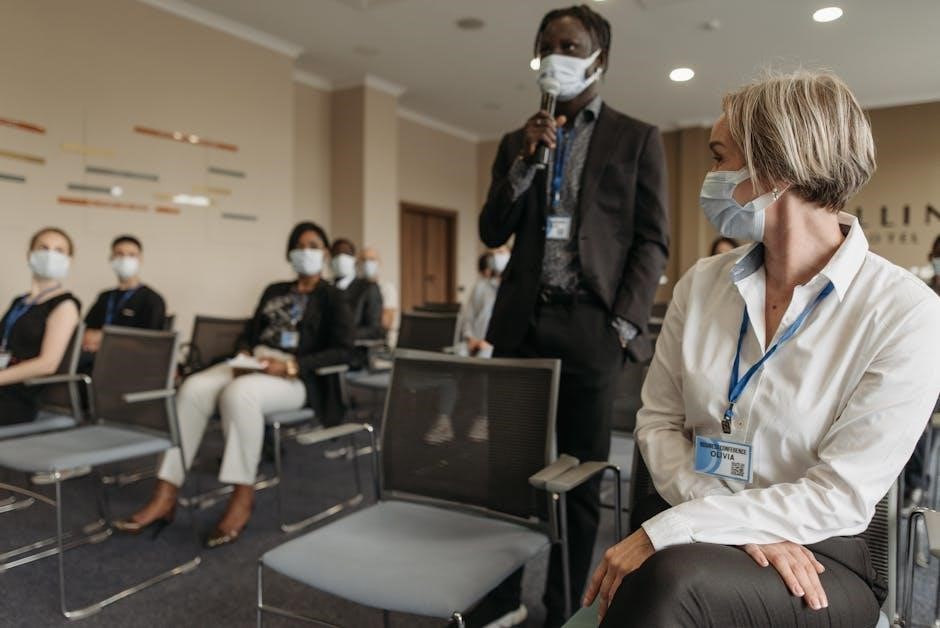The ninth edition of Cultural Diversity in Health and Illness by Rachel E. Spector is a comprehensive resource exploring health disparities, traditional practices, and cultural competence in healthcare; It examines the complexities of caring for diverse populations within North America, emphasizing the importance of understanding cultural perspectives to enhance patient care and outcomes. This edition serves as an essential guide for healthcare professionals, promoting awareness and sensitivity in addressing the unique needs of diverse patient populations.
Overview of Cultural Diversity in Healthcare
Cultural diversity in healthcare encompasses the varying beliefs, practices, and values of diverse populations, significantly impacting care delivery. The ninth edition of Cultural Diversity in Health and Illness highlights the complexities of the healthcare system and patient-provider interactions. It emphasizes the importance of understanding cultural differences to address health disparities and improve outcomes. This resource explores traditional health beliefs, practices, and the integration of cultural competence in modern healthcare settings.
The Importance of Cultural Competence in Health Care
Cultural competence is vital in healthcare to ensure high-quality, patient-centered care. It enables providers to understand and respect diverse health beliefs, practices, and values. The ninth edition of Cultural Diversity in Health and Illness emphasizes the role of cultural competence in improving patient outcomes, reducing disparities, and fostering trust. By addressing cultural differences, healthcare professionals can deliver care that aligns with patients’ needs, enhancing satisfaction and adherence to treatment plans.
Key Concepts in Cultural Diversity and Health
The ninth edition explores key concepts such as diverse health beliefs, practices, and cultural influences on health outcomes, emphasizing the importance of cultural competence in care.
Definition and Scope of Cultural Diversity in Health Care
Cultural diversity in health care refers to the variety of cultural beliefs, values, and practices that influence health behaviors and outcomes. It encompasses understanding diverse patient populations’ unique needs, traditions, and healthcare expectations. The scope includes addressing disparities, promoting equitable care, and integrating cultural competence into clinical practice, policy, and community health initiatives to ensure effective, patient-centered care across all cultural backgrounds.
The Role of Culture in Shaping Health Beliefs and Practices
Culture profoundly influences perceptions of health and illness, treatment preferences, and interactions with healthcare providers. It shapes beliefs about causes of illness, such as spiritual or natural factors, and dictates practices like traditional healing rituals. Understanding these cultural dimensions is crucial for providing care that respects patients’ values and promotes positive health outcomes, ensuring alignment between modern medicine and diverse cultural traditions.

Cultural Competence in Health Care Practice
Cultural competence in healthcare involves understanding and respecting diverse patient beliefs, values, and practices. It ensures tailored care, improving communication and health outcomes, as emphasized in the 9th edition.
Strategies for Developing Cultural Competence
Developing cultural competence involves self-assessment, education, and practice. The 9th edition highlights strategies like cultural self-reflection, patient-centered communication, and continuous learning about diverse health beliefs. These approaches foster empathy and understanding, enabling healthcare providers to deliver culturally sensitive care. Regular training and engagement with diverse populations further enhance these skills, ensuring effective and respectful interactions in clinical settings.
Addressing Health Disparities Through Cultural Competence
Cultural competence is vital in reducing health disparities by ensuring equitable care for diverse populations. The 9th edition emphasizes strategies to identify and address biases, improve communication, and tailor interventions to meet specific cultural needs. By understanding and respecting patients’ health beliefs, healthcare providers can overcome barriers and deliver care that bridges gaps in access and outcomes, promoting health equity across all communities.

Cultural Assessments and Interviews
Cultural assessments are crucial in understanding patients’ backgrounds and beliefs. The ninth edition highlights effective communication strategies to conduct thorough interviews, ensuring culturally sensitive care delivery.
Conducting a Cultural Assessment

Conducting a cultural assessment involves recognizing the influence of cultural beliefs, values, and practices on health behaviors. The ninth edition emphasizes the importance of understanding patients’ cultural backgrounds to provide personalized care. It highlights effective communication techniques, such as active listening and empathy, to gather accurate information about health practices, beliefs, and preferences. This process ensures a patient-centered approach, fostering trust and improving health outcomes. Cultural assessments also require cultural humility and collaboration with interpreters when needed, ensuring accurate understanding and documentation of patient needs.
Effective Communication Techniques in Cross-Cultural Interviews
Effective communication in cross-cultural interviews requires cultural humility, active listening, and empathy. The ninth edition highlights the importance of clear and simple language to avoid misunderstandings. Non-verbal cues, such as body language and eye contact, should be considered to respect cultural norms. Using professional interpreters when necessary ensures accurate communication. These techniques foster trust, enhance patient understanding, and improve health outcomes by bridging cultural gaps in healthcare settings.
Traditional Health Practices and Beliefs
The ninth edition explores traditional health practices, such as healing rituals, herbal remedies, and spiritual ceremonies, highlighting their cultural significance and integration into modern healthcare systems.
Exploring Traditional Health Practices Across Cultures
The ninth edition examines traditional health practices, such as healing rituals, herbal remedies, and spiritual ceremonies, across diverse populations. It highlights how American Indian, Asian, Black, Hispanic, and White cultures maintain unique health beliefs and practices. These traditions often blend with modern healthcare, emphasizing the importance of cultural sensitivity in integrating these practices into contemporary health care delivery systems. This exploration underscores the richness and diversity of global health traditions.
Integrating Traditional Practices into Modern Health Care
Integrating traditional health practices into modern care enhances cultural competence and patient outcomes. By respecting patients’ beliefs and incorporating practices like herbal remedies or spiritual healing, healthcare providers can create holistic care plans. This integration fosters trust and improves patient satisfaction, ensuring culturally sensitive care that bridges traditional and contemporary health approaches, ultimately enriching healthcare delivery and promoting equity for diverse populations.

Health and Illness in Diverse Populations
Health and illness vary across diverse populations, including American Indian, Alaska Native, Asian, Black, Hispanic, and White communities, each shaped by unique cultural and social factors.
Health and Illness in American Indian and Alaska Native Populations
American Indian and Alaska Native populations face unique health challenges, including high rates of chronic diseases and limited access to care. Their health beliefs often blend traditional practices, such as spiritual healing, with modern medicine. Cultural practices, like rituals and community support, play a significant role in wellness. Historical trauma and socioeconomic disparities further impact their health outcomes, emphasizing the need for culturally sensitive care tailored to their specific needs and values.
Health and Illness in Asian, Black, Hispanic, and White Populations
Asian, Black, Hispanic, and White populations exhibit diverse health beliefs and practices shaped by cultural, social, and historical contexts. Asians may emphasize harmony and traditional remedies, while Black populations often experience health disparities linked to systemic racism. Hispanic communities frequently blend spiritual beliefs with Western medicine, and White populations show varied health behaviors influenced by socioeconomic factors. Understanding these nuances is crucial for delivering culturally competent care tailored to each group’s unique needs and values.

Legal and Ethical Considerations
Cultural diversity in health care raises legal and ethical challenges, including patient rights, informed consent, and bias in treatment. Providers must ensure equitable, culturally sensitive care while adhering to legal standards.
Cultural Diversity and Legal Implications in Health Care

The ninth edition of Cultural Diversity in Health and Illness highlights legal implications, including patient rights, informed consent, and potential biases in treatment. Adhering to legal standards while addressing cultural differences is crucial to avoid discrimination and ensure equitable care. Providers must navigate these challenges to deliver lawful, ethical, and culturally sensitive health services.
Ethical Issues in Providing Culturally Competent Care
Providing culturally competent care raises ethical challenges, such as respecting patient autonomy while navigating diverse health beliefs. The ninth edition emphasizes balancing cultural sensitivity with evidence-based practices. Ethical dilemmas often arise from biases, stereotypes, and communication barriers. Addressing these issues requires self-reflection, empathy, and adherence to ethical standards, ensuring care is respectful and inclusive of all cultures and beliefs, as highlighted in the text.
Cultural Diversity in Health Education and Practice
The ninth edition emphasizes integrating cultural diversity into health education and practice, fostering inclusive care delivery. It addresses strategies to enhance cultural competence among healthcare professionals, ensuring respectful, patient-centered care that honors diverse beliefs and practices.
Integrating Cultural Diversity into Health Education
The ninth edition highlights the importance of incorporating cultural diversity into health education curricula. It provides strategies for educators to train students in cultural competence, ensuring they understand diverse health beliefs and practices; This approach fosters inclusive care delivery and prepares healthcare professionals to address disparities effectively. The book serves as a vital resource for promoting culturally sensitive education and practice.
Best Practices for Culturally Sensitive Health Care Delivery
The ninth edition emphasizes best practices for delivering culturally sensitive care, including communication strategies and respecting patients’ health beliefs. It provides tools for healthcare providers to assess cultural needs, ensuring tailored care. These practices aim to reduce disparities and improve patient outcomes, fostering trust and collaboration between providers and diverse populations.

Global Perspectives on Cultural Diversity in Health
The ninth edition explores global perspectives on cultural diversity in health, highlighting international practices and challenges in delivering culturally competent care worldwide.
Cultural Diversity in Health Care: A Global Overview
Cultural Diversity in Health and Illness, 9th Edition, provides a global perspective on health care, examining how cultural differences impact health systems worldwide. It explores traditional practices, beliefs, and modern integrations across diverse populations, offering insights into addressing disparities and fostering culturally competent care globally. This overview emphasizes the importance of understanding international health trends to improve care delivery across borders.
Challenges and Opportunities in Global Health Care Delivery
Global health care delivery faces challenges such as cultural misunderstandings, resource disparities, and varying health practices. However, opportunities exist through cultural competence training, technology integration, and collaborative international efforts. Cultural Diversity in Health and Illness, 9th Edition, highlights these dynamics, offering strategies to navigate challenges and enhance care delivery worldwide, ensuring equitable and effective health services across diverse populations.
Future Directions in Cultural Diversity and Health
Cultural competence training and technology integration are key future trends, enhancing cross-cultural care and education, as highlighted in the 9th Edition of Cultural Diversity in Health and Illness.
Emerging Trends in Cultural Competence Training

Emerging trends include integrating technology, such as AI-driven simulations, to enhance cultural competence training. The 9th Edition highlights the use of interactive modules and case studies to address microaggressions and implicit bias. There is also a growing emphasis on holistic approaches, incorporating patients’ cultural beliefs into care plans. These innovations aim to bridge gaps in cross-cultural communication and improve health outcomes for diverse populations, as discussed in the textbook.
The Role of Technology in Enhancing Cultural Competence
The 9th edition highlights technology’s role in advancing cultural competence, such as AI-driven simulations for training and telehealth platforms improving cross-cultural communication. Digital tools provide healthcare professionals with diverse patient scenarios, fostering culturally sensitive care. Technology bridges gaps in understanding, enabling better navigation of cultural differences and enhancing patient outcomes, as emphasized in the textbook.
The 9th edition emphasizes cultural competence as vital for improving healthcare outcomes. It serves as a key resource for understanding diverse patient needs, fostering inclusive care.
Summarizing Key Takeaways
The 9th edition of Cultural Diversity in Health and Illness highlights the importance of cultural competence in healthcare, emphasizing the need to address health disparities and understand diverse health beliefs. It provides insights into traditional practices and modern healthcare integration, serving as a vital resource for professionals aiming to deliver culturally sensitive care. The book underscores the complexities of caring for diverse populations and the importance of inclusive, patient-centered approaches.
Final Thoughts on the Importance of Cultural Diversity in Health Care
Cultural diversity in health care is essential for delivering equitable and effective care. Understanding and respecting patients’ cultural beliefs and practices fosters trust and improves health outcomes. The 9th edition of Cultural Diversity in Health and Illness underscores the need for cultural competence, highlighting its role in addressing disparities and enhancing care quality. This resource remains a cornerstone for healthcare professionals committed to providing inclusive, patient-centered care.
